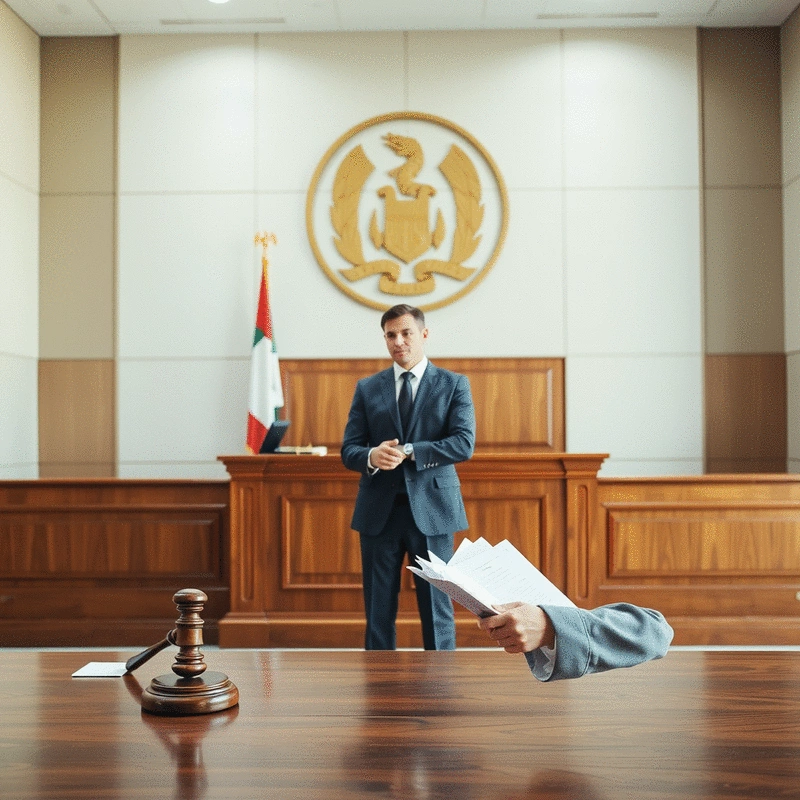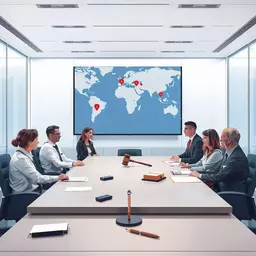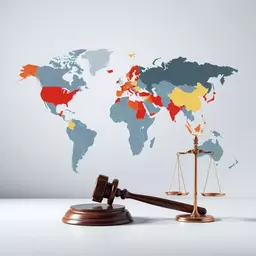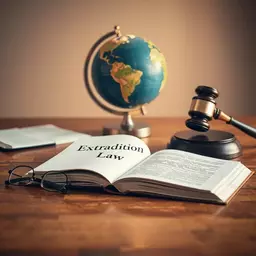Extradition Defense Strategies in UAE

Extradition is not just a legal term; it represents a critical intersection of international law and human rights. In an age where crossing borders is easier than ever, the importance of understanding extradition cannot be overstated. As the global landscape evolves, so does the necessity for informed legal defense strategies. Let’s delve into the essential takeaways about extradition law in the UAE that can help individuals facing these complex challenges.
Key Takeaways
- Extradition is the formal process of transferring accused individuals between countries to ensure justice is served.
- The UAE's extradition laws are governed by Federal Law No. 39 of 2006, emphasizing the importance of fairness and human rights.
- The UAE does not extradite individuals for political crimes or offenses that risk severe punishments, such as the death penalty.
- International treaties, like the Arab Convention on Extradition and bilateral agreements with nations such as the U.S. and UK, facilitate cooperation on extradition matters.
- Understanding the legal framework can empower individuals facing extradition to develop effective defense strategies.
- Key defense strategies include challenging the legality of the extradition request, highlighting procedural violations, and invoking human rights protections.
- Engaging an experienced extradition lawyer is crucial for navigating complex legal landscapes and formulating tailored defense strategies.
- Utilizing resources like legal directories and referrals can help individuals find qualified legal assistance for extradition matters in the UAE.
Key Aspects of Extradition in the UAE
Understanding the critical elements involved in the extradition process within the UAE's legal framework.
UAE's Extradition Law
The legal framework is primarily governed by Federal Law No. 39 of 2006, establishing conditions for extradition requests.
Criteria for Extradition
- Extradition must align with treaties and international agreements.
- Human rights considerations must be evaluated.
- Extradition is not allowed for political crimes.
Key Treaties Involved
- Arab Convention on Extradition
- Bilateral treaties with the US, France, and the UK
- Agreements within the Gulf Cooperation Council (GCC)
Implications of Extradition
Understanding the laws can lead to effective defense strategies and impact personal and professional lives significantly.
Understanding Extradition in the UAE: A Comprehensive Overview
Extradition can seem like a daunting term, but at its core, it's about bringing someone accused of a crime to face justice in a different country. In the UAE, understanding extradition is crucial for anyone navigating the complexities of international law. It plays an essential role in ensuring that individuals can't evade legal consequences by simply crossing borders. So, let’s explore what extradition means and why it’s so important in the global legal landscape!
Defining Extradition and Its Importance in International Law
Extradition refers to the formal process where one country requests the surrender of an individual from another. This process is vital in combating crime that crosses borders, ensuring that fugitives cannot find refuge in nations that do not harbor extradition agreements. In essence, extradition strengthens international law by promoting cooperation among countries.
Why should we care about extradition? Think of it this way: if a person commits a crime in one nation and flees to another, extradition holds them accountable. This not only aids in delivering justice but also deters potential offenders from thinking they can escape the law simply by relocating. For those facing such challenges, consulting with criminal defense lawyers in Dubai can be a crucial step in understanding their rights and options.
Overview of UAE’s Legal Framework for Extradition
The UAE has a robust legal framework guiding its extradition processes, primarily governed by Federal Law No. 39 of 2006. This law outlines the conditions under which extradition requests can be accepted or denied. The framework is designed to ensure fairness while maintaining the security of the nation.
It’s important to note that the UAE does not extradite individuals for political crimes or offenses that could lead to severe punishment, such as the death penalty. This provision reflects the UAE's commitment to protecting human rights while engaging in international legal cooperation.
- Extradition requests must be made through proper diplomatic channels.
- Requests are evaluated based on existing treaties and international agreements.
- Human rights considerations play a significant role in the approval process.
Key International Treaties Involving UAE Extradition
The UAE is a signatory to several bilateral and multilateral treaties that facilitate extradition. These treaties are essential as they outline the obligations and procedures for extradition between the UAE and other countries. Some key treaties include:
- The Arab Convention on Extradition.
- Bilateral treaties with countries like the United States, France, and the UK.
- Various agreements within the Gulf Cooperation Council (GCC).
These treaties help streamline extradition processes, making it easier for nations to cooperate against transnational crime. Understanding these agreements can empower those facing extradition in the UAE.
UAE Extradition Law and Its Implications
UAE extradition law reflects a balance between upholding international obligations and protecting individual rights. As established by the Federal Law No. 39, there are specific criteria that must be fulfilled for an extradition request to be granted. This includes the requirement that the requested crime is also an offense in the UAE.
For individuals facing extradition, being aware of these laws is crucial. They can significantly impact the outcome of their case, and understanding them can lead to effective defense strategies. Moreover, the implications of extradition can extend beyond legal consequences, affecting personal and professional lives as well.
The Role of the UAE Ministry of Justice in Extradition Processes
The UAE Ministry of Justice plays a pivotal role in overseeing the extradition process. They are responsible for evaluating requests, ensuring compliance with legal standards, and facilitating communication between involved countries. This ministry acts as a bridge between international law and domestic legal frameworks, making them a key player in extradition cases.
Furthermore, the Ministry of Justice helps set guidelines for legal practitioners and individuals navigating these complex waters. For anyone facing extradition, understanding the ministry’s role can be invaluable in formulating a strategic approach to their defense. Understanding extradition laws in the UAE is crucial for anyone navigating this complex legal landscape.
In summary, grasping the intricacies of extradition law in the UAE is essential for those involved in or at risk of facing extradition. Knowledge can empower individuals to navigate these challenging legal landscapes more effectively. Stay informed, and remember, at Extradition Interpol UAE, we’re here to help illuminate these complex matters for you!
Quick Summary
Here's a brief recap of the key points discussed so far:
- Extradition is the process of surrendering an individual accused of a crime to another country, which is crucial for international law.
- The UAE has a robust legal framework outlining the conditions for extradition requests, emphasizing fairness and human rights.
- Several treaties facilitate extradition between the UAE and other countries, enhancing cooperation against transnational crime.
- The Ministry of Justice in the UAE plays a critical role in evaluating extradition requests and ensuring compliance with legal standards.
FAQs About Extradition in the UAE
What is extradition?
Extradition is the formal process where one country requests the surrender of an individual from another country to face criminal charges or serve a sentence.
What law governs extradition in the UAE?
Extradition in the UAE is primarily governed by Federal Law No. 39 of 2006, which sets out the conditions and procedures for extradition requests.
Will the UAE extradite individuals for political crimes?
No, the UAE does not extradite individuals for political crimes or for offenses that could result in severe punishments like the death penalty.
What are some key international treaties that the UAE is a part of regarding extradition?
The UAE is a signatory to several treaties, including the Arab Convention on Extradition, bilateral treaties with countries such as the United States, France, and the UK, as well as agreements within the Gulf Cooperation Council (GCC).
What role does the UAE Ministry of Justice play in extradition processes?
The UAE Ministry of Justice evaluates extradition requests, ensures compliance with legal standards, and facilitates communication between the involved countries.
What are some effective defense strategies against extradition in the UAE?
Effective defense strategies include challenging the legality of the extradition request, highlighting procedural violations, arguing against potential human rights violations, and invoking the non-refoulement principle.
Conclusion: Key Takeaways on Defense Strategies for Extradition in the UAE
As we wrap up our exploration of extradition in the UAE, it's clear that understanding the available defense strategies is essential for anyone facing extradition requests. The complexities of international law can be overwhelming, but having a solid grasp on the legal frameworks and potential defenses can make a significant difference. Whether you are navigating a high-profile case or a personal legal challenge, knowledge is your strongest ally!
Here are some effective defense strategies to keep in mind when confronting extradition:
- Challenging the legality of the extradition request.
- Highlighting any procedural violations that may weaken the case.
- Arguing against potential human rights violations.
- Using the non-refoulement principle to protect your rights.
Summarizing Effective Defense Strategies Against Extradition
Throughout this discussion, we've seen how various approaches can be employed to challenge extradition requests. As a seasoned legal expert, I believe that each case demands a tailored strategy. The importance of a comprehensive legal defense cannot be overstated, as it can affect the outcome significantly. I encourage individuals facing extradition to take proactive steps and not leave their fate to chance! Furthermore, understanding how to navigate Interpol Red Notices can also be crucial; explore navigating Interpol Red Notices for legal defense.
Remember that engaging an experienced extradition lawyer is crucial. Not only can they navigate the complexities of UAE laws, but they can also provide insights into the most effective strategies for your specific situation. The right legal team can make a world of difference in the fight against unjust extradition requests.
Encouraging Readers to Seek Legal Advice for Individual Cases
If you or someone you know is entangled in an extradition matter, don't hesitate to seek legal advice. At Extradition Interpol UAE, we believe that being informed is empowering. Consulting with professionals who specialize in extradition law can open doors to options you may not have considered. It's not just about winning your case; it’s about securing your future and peace of mind.
Take charge of your situation by reaching out to a qualified lawyer who understands the intricacies of UAE’s extradition processes. Your rights and freedoms are paramount, and having the right advocate can help safeguard them.
Providing Resources and Contacts for UAE Extradition Lawyers
To assist you further, here are some useful resources for finding reputable extradition lawyers in the UAE:
- Visit local legal directories and bar associations.
- Ask for referrals from trusted contacts or legal professionals.
- Consult online platforms that review and rate legal services.
These resources can connect you with experienced professionals who can guide you through the complexities of your case, ensuring that you have the best possible chance to defend against extradition.
The Role of Law Firms in the UAE in Assisting Extradition Defense
Law firms specializing in extradition law play a critical role in defending individuals facing extradition requests. They bring a wealth of knowledge and experience that can be invaluable. These firms can analyze your case, identify weaknesses in the extradition request, and craft a strong defense. It’s also important to be aware of how to respond if you receive responding to an Interpol Red Notice, which can often precede extradition proceedings.
Moreover, they understand the local legal landscape and can navigate the nuances of the UAE's legal system effectively. If you find yourself facing extradition, remember that you’re not alone. Reach out, seek help, and explore the options available to you!
Recap of Key Points
Here is a quick recap of the important points discussed in the article:
- Extradition is the formal process of surrendering an individual accused of a crime from one country to another, essential for maintaining justice across borders.
- The UAE’s extradition framework is governed by Federal Law No. 39 of 2006, which emphasizes fairness while addressing security concerns.
- Human rights considerations are crucial in the UAE's extradition process; the UAE does not extradite individuals for political crimes or those facing severe punishments.
- Key international treaties facilitate extradition processes, including agreements with the US, UK, and Arab nations, promoting international cooperation against crime.
- Effective defense strategies against extradition include challenging the request's legality, highlighting procedural violations, and arguing potential human rights infringements.
- Engaging an experienced extradition lawyer is vital for navigating the complexities of the UAE's legal landscape and formulating a strong defense.
- Utilizing resources such as local legal directories and referrals can help individuals find qualified extradition lawyers for assistance.



